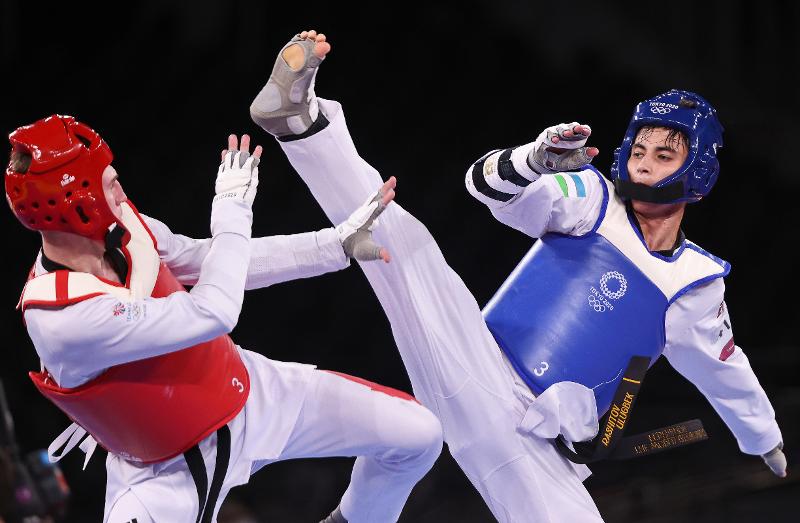
Ulugbek Rashitov from Uzbekistan (right) and Bradly Sinden from the U.K. (left) on July 25 vie for the gold medal in the men's 68-kg taekwondo final in the Tokyo 2020 Summer Olympics at the convention center Makuhari Messe in the Japanese capital. Rashitov won the bout, 34-29. (TASS)
By Lee Jihae
The New York Times on July 26 said taekwondo offers the opportunity of earning medals to countries that have had a hard time winning glory in the Olympics.
In the article "Taekwondo Is Path to Medals for Countries That Rarely Get Them," the daily said,"Of all the Olympic events, taekwondo is perhaps the most generous to the wealth of nations that exist on the margins of international sport."
Since the martial art was adopted as an official event at the 2000 Sydney Summer Olympics, The Times added, "it has managed to deliver more than a dozen medals to countries that have relatively few athletes at the Olympics and, until recently, even fewer hopes of triumphing in anything at all."
Cote d'Ivoire (Ivory Coast), Jordan and Taiwan each won their first Olympic golds in history through taekwondo and Niger, Vietnam and Gabon earned their first silvers through the same method. Afghanistan's lone Olympic medals are a pair of bronzes and are also from taekwondo.
The article said athletes from 61 nations and three members of the Refugee Olympic Team are competing in taekwondo in the Tokyo Games, calling it "remarkable diversity for a sport that had been contested in only five Games (from 2000-16)."
"More than a dozen flag-bearers for Olympic teams in Tokyo are taekwondo fighters, underscoring the sport's significance to smaller sporting nations," it added.
Other sports like gymnastics or boxing have higher profile and viewership than taekwondo, the report said, but the martial art is practiced by tens of millions of people in Africa, Asia and the Middle East. The art's popularity is partially attributed to the "fact that it requires neither expensive equipment nor expansive fields," it added.
Issaka Ide, president of the Niger Olympic Committee and formerly the head of his country's taekwondo federation, was quoted as saying, "For a poor country like Niger, this sport is the best," adding, "Although the sport is from Korea, we have made it ours because it is very easy to practice without much equipment."
The Times said the "multiplier effect" is greatest in countries with fewer medals in the Olympics, citing the example of Ahmad Abughaush, a taekwondo fighter from Jordan who won his country's first Olympic medal – a gold – in the men's 68-kg division at the 2016 Rio de Janeiro Summer Olympics. More than 50,000 taekwondo uniforms were sold in his country within three months after his historic win.
The article also called taekwondo Korea's "first successful cultural export" before K-pop, K-dramas and kimchi fried rice.
jihlee08@korea.kr
Most popular
- Slew of festivals, events scheduled in downtown Seoul in May
- Korea.net welcomes 2025 K-influencers, Honorary Reporters
- 2025 Honorary Reporter class pledges to spread 'real Korea' worldwide
- US urged to exempt tariffs on Korea in first '2+2' trade talks
- Korean culture festival in Cuba marks 1st year of bilateral ties
